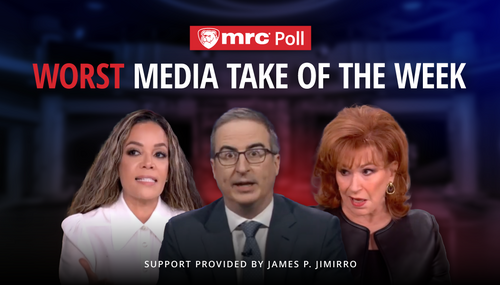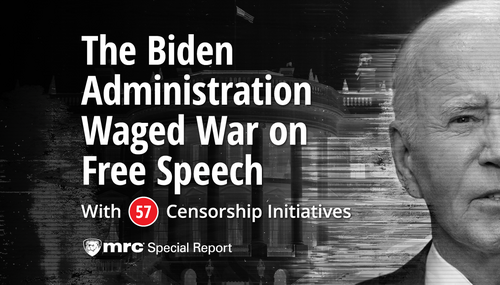The Washington Post isn't good at being subtle when it comes to Donald Trump and Hillary Clinton. It's quite easy to figure out which one is the Democrat, simply from the photos and photo illustrations they chose on the last two Sundays. Here's a Twitter primer:
Trump might like this frowny photo, but I'm sure the WashPost thinks it's a turn-off. #TTT16 pic.twitter.com/400Onugq1L
— Tim Graham (@TimJGraham) July 17, 2016
WashPost goes with grande-dame half-smile on convention section. Trump had no smile last Sunday... pic.twitter.com/DCv4MvtsRs
— Tim Graham (@TimJGraham) July 24, 2016
Those end up being a fairly close match, perhaps. The wilder contrast is on the front of the Outlook section. While Trump was shamelessly pictured as so dangerously prone to anger that he had a mushroom cloud where his brain belongs, Hillary was presented in softer focus, as an "expansive thinker" who so deserves the prize she seeks.
The Washington Post makes Trump a Mushroom Cloud Head. #TTT16 pic.twitter.com/QJrXnmWKPm
— Tim Graham (@TimJGraham) July 17, 2016
...And to match Trump's Mushroom Cloud Head last week on WashPost Outlook page... pic.twitter.com/syphSxZKG2
— Tim Graham (@TimJGraham) July 24, 2016
This is the kind of contrast that really makes this paper looks like an office building full of Democrat hacks. Last week the Post turned to J. Peter Scoblic to explain why Trump is too petulant for the nuclear launch codes, which gibes exactly with the DNC talking points:
So what happens if we have a president who is incapable of inaction, preternaturally irascible and fixated on payback? (As Trump’s wife, Melania, put it, “When you attack him, he will punch back 10 times harder.”) Nuclear scenarios are obviously the scariest — which is why critics from Hillary Clinton to New Yorker humorist Andy Borowitz to former defense secretary Bob Gates have warned that Trump shouldn’t get the launch codes. But the codes are really a metonym for foreign policy more broadly. The risk is less that a President Trump might launch a nuclear strike out of pique and more that his judgment on national security issues would be thoroughly compromised by what resembles an almost pathological anger.
This week, readers and check out Post book reviewer Carlos Lozada gushing over Hillary's memoirs as the best way to understand her: sure they're "propaganda," but they the propaganda tells us who she is: "she is a talented writer and expansive thinker whose writing and thinking grow more cautious as the prize of the presidency draws nearer....Even her Secret Service code name, “Evergreen,” is apt, the perfect label for a candidate whose principal qualification for the presidency is her eternal readiness for it."
This is the same Carlos Lozada who took over the front of the Outlook section six weeks ago to compare Trump to the fascist dictators of American (leftist) fiction by Sinclair Lewis and Philip Roth:
Americans have seen this leader before. Boastful, deceptive, crudely charismatic. Dabbling in xenophobia and sexism, contemptuous of the rule of law, he spouts outlandish proposals that cater to the lowest instincts of those angry or frightened enough to back him. He wins the nation’s top office, triggering fears of an authoritarian, even fascistic U.S. government.
Normally, though, this leader resides safely in the pages of American fiction....
Reading these works in this moment, it is impossible to miss the similarities between Trump and totalitarian figures in American literature — in rhetoric, personal style and even substance. Yet the American-bred dictators are not the true protagonists. Ordinary citizens, those who must decide how to live under a leader who repudiates democratic values and institutions, are the real story. They must choose: Resist or join? Speak up or keep your head down? Fight or flee?
If Trump is elected and the fears of those crying “fascism” materialize, it is those characters and their choices that become especially relevant. In Donald Trump’s anti-America, what would you do, and who would you be?




